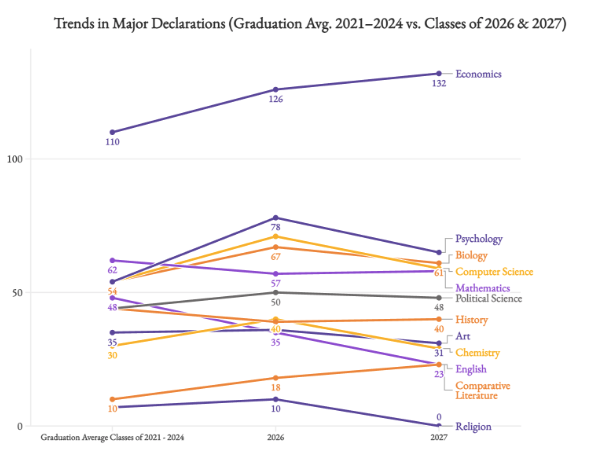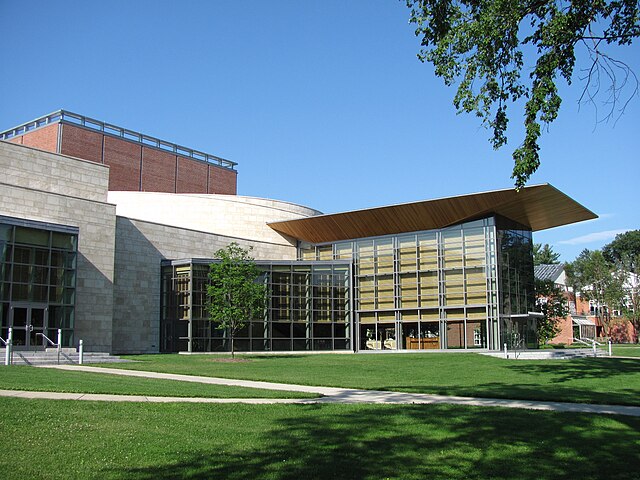
The department of German and Russian is decoupling its introductory language courses, eliminating the requirement for students enrolled in “GERM 101: Elementary German” or “RUSS 101: Elementary Russian” in the fall to take “GERM 102” or “RUSS 102” the following spring. The change took effect for “GERM 101” this academic year, and will expand to “RUSS 101” in the 2025-26 academic year. Until this year, all introductory language courses at the College, including “GERM 101-102” and “RUSS 101-102,” required students continue for the entire year in order to earn credit for both courses.
The German program began piloting this new model last fall, allowing students enrolled in “GERM 101” to earn credit for the course without committing to “GERM 102,” the second course in the introductory sequence. Despite this change, enrollment numbers across both courses were steady and attrition was minimal, Chair of German and Russian Gail Newman said in an interview with the Record. “There was only one person we lost from the group,” she said. “The rest continued and, in fact, we gained a couple people in 102.”
“The German department [has] facilitated this learning process that has made it more enticing to keep learning German,” Ricardo Santana ’27, a current student in “GERM 102,” said. “Even if I had gone into it saying, ‘Oh, I just want to do one semester and take my [Division 1] credit,’ I feel like by the end of that semester, I would have been like, ‘No, give me another one.’”
Before this change, students, such as those studying abroad for the spring semester, were able to petition the department to award credit for only the first semester of an introductory language course. “In German, we found we were granting them all the time, and so it made sense for us to just change our policy,” Newman said.
Though hyphenation, the practice of requiring students to take both courses in a sequence to receive credit, ensures that students finish their studies with a strong grasp of the language, Newman explained, the requirement does not seem to impact students’ experiences in the German program. “It’s just weighing different kinds of values,” she said. “The pedagogical and learning value of getting to that second semester level versus the burden on students who are put in a position of really having a hardship for choices that they make.”
The programs hopes the change will help reduce students’ hesitation to explore German and Russian. Many students interested in learning a new language are uncertain about committing to a full-year course, Professor of Russian Janneke van de Stadt told the Record. “The necessity to take a full-year [ introductory course]… stops them from even dipping their feet in the Russian pond,” van de Stadt said. “I’m hopeful that this [change] will allow more students to take 101, experience it, and continue [Russian].”
Many students’ worries about the year-long commitment dissipate quickly as their first semester of Russian unfolds, van de Stadt explained. “I’m not concerned about the retention rate from 101 to 102,” she said. “Because we so seldom have had people not want to continue.”
Despite the change to Russian and German, other departments will maintain their hyphenated models. Professor of Asian Studies Cornelius Kubler noted that hyphenation makes sense for Chinese, as the language requires more time to achieve basic proficiency.
“The tones and grammar of spoken Chinese and the characters of written Chinese take some getting used to,” he wrote in an email to the Record. “One semester’s worth is simply too little to be of much use or form a ‘critical mass.’”
Kubler also emphasized the importance of continuity in Chinese instruction, noting that many students initially face difficulties but benefit from a second semester of introductory Chinese. “We not infrequently see students who encounter great learning challenges in the first semester, but somewhere in the middle of Chinese 102, they start ‘getting it’ and end up the first year in decent shape and in some cases go on to take several more years,” he wrote.
“It’s cool, because you start with a bunch of people who don’t know the language,” Santana said. “[Now,] we’re pretty much almost done with 102 and everybody is in a really impressive spot, as far as how far their language skills have gone.”
By making the change, the department of German and Russian hopes to encourage more students to give language learning a try, Newman emphasized. “In a world where the United States is getting more and more isolated,” she said. “It’s really important to have a link to other languages, other cultures.”













